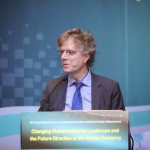Modernizing developed economies in order to remain competitive in global markets is a pressing issue when manufacturing jobs can be automated or off-shored, with the threat of many of these jobs disappearing in the nearer future. This potentially affects all developed economies, but in particular manufacturing-heavy countries such as Germany or Korea.

The Korean Development Institute (KDI) recently organized an international expert forum in Seoul to discuss how to promote future employment potentials in different types of services. A major challenge is to take advantage of technical innovations such as digitalization to create new and more sophisticated manufacturing goods that can be complemented by services. In the future we will likely see more service-oriented types of employment around innovative manufacturing core activities. Here, skill formation, but also regional and sectoral clustering is important. And the better this works, the smaller is the risk of off-shoring and automation, as IZA Director of Labor Policy Europe Werner Eichhorst explained at this event, using the German experiences as a case in point.
Related to the issue of rapid structural change and observable job polarization between knowledge-intensive and personal service tasks in many developed economies is the important issue of creating employment opportunities for the most disadvantaged, in particular the low-skilled and the long-term unemployed. Here, different options are available: training investment, publicly supported employment and direct job creation or a more flexible labor market relying on non-standard types of employment and low pay.
An international workshop organized by the Korean Employment Information Service (KEIS) collected the international evidence and stimulated the exchange of national experiences with these policy approaches. Apart from questions around the design and evaluation of active labor market policies for the most vulnerable groups, Werner Eichhorst addressed the issue of low pay and increased labor market flexibility as an alternative option in order to foster job creation for low-skilled or long-term unemployed people.
Werner Eichhorst also appeared on Korea’s Arirang television (Dec. 4, 2014):
